30th Anniversary Celebration Interview and Sale: Part Three
Mike Allen / Sunday, September 25th, 2022 / No Comments »Six dark fantasy and horror titles
discounted to 99¢
for an early Halloween start
See a map of how my stories and upcoming novel connect
Read the beginning of my 30th anniversary interview
Read the second part of the interview
How did you rise to become the president of the Science Fiction and Fantasy Poetry Association? What was that experience like?
I want to phrase this in a way that’s respectful of those who are no longer with us.
I only became aware of the Science Fiction Poetry Association in 1998, the first time one of my poems was nominated for a Rhysling Award. The organization, though, had been around since 1978!
In 2002, Anita and I and a whole contingent of people involved with DNA Publications traveled to Arisia in Boston. At that convention there was a meeting conducted for SFPA members. I had joined and was curious, but I found the meeting disappointing. I left with what I will call, tongue-in-cheek, a dangerous thought: “I could do this better myself.”
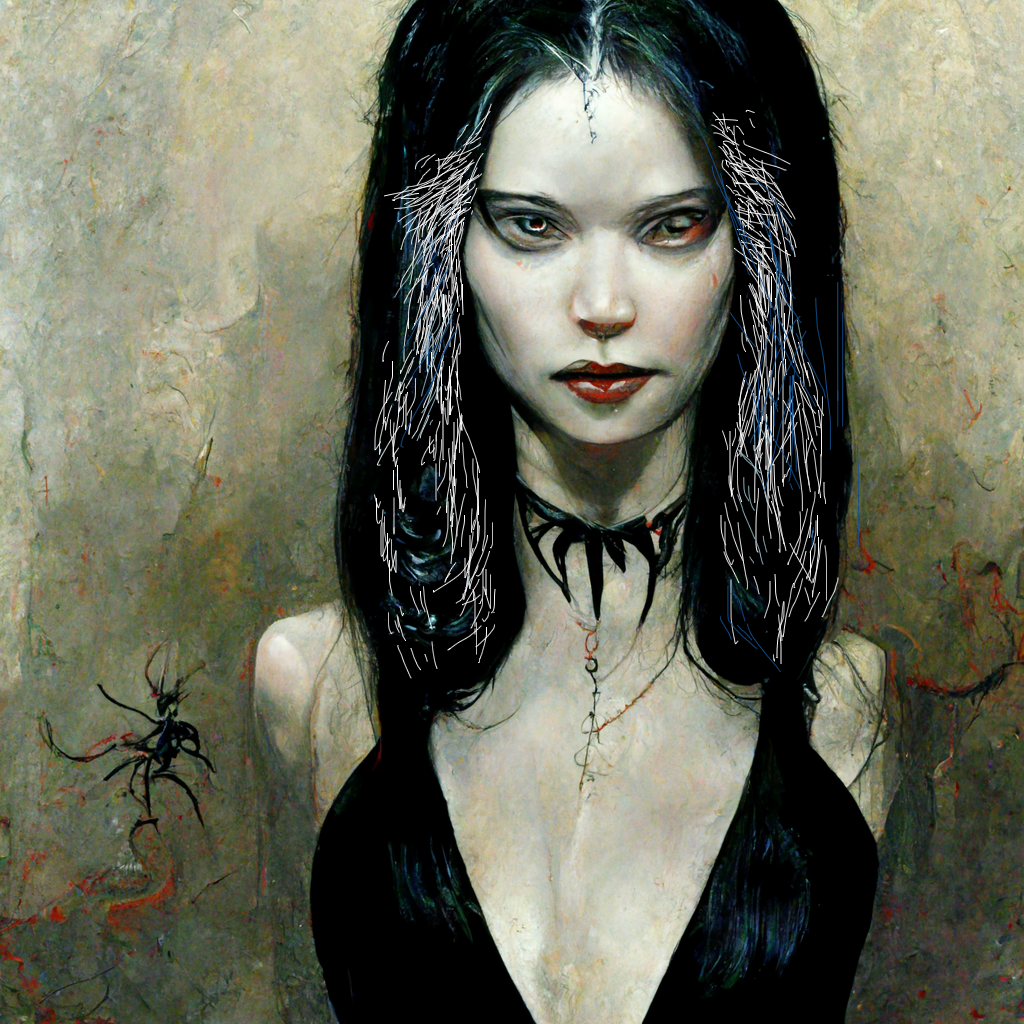
Inspired by “Lilith,” antagonist from “The Cruelest Team Will Win” and Trail of Shadows
To drill down a little into why I felt that way, what I had hoped for was to find an organization that advocated with vigor for this art form I had come to embrace, and that served as a center of gravity for an enthusiastic community. At that time, SFPA fulfilled neither function. (Others may disagree, but that was my takeaway.) At best, it managed the bare minimum needed to keep from dissolving, and once volunteering took me behind the scenes, I realized the organization hung on by threads.
My bid for president resulted in the first contested election in the SFPA’s history. The group is approaching its 45th anniversary, so I guess you could say my time at the helm, only two years, was a short interval within SFPA’s lifespan. But it was intense. There are things that now I might wish I had done better, or differently, but perhaps most important in the first place, things got done.
Some of the things I tried, like establishing a regular SFPA presence at Readercon in Boston, including an official Rhysling Award ceremony, ultimately fell by the wayside — but those ceremonies were glorious while they lasted. Some things that I tried and failed to do, like changing the organization’s name to the Science Fiction and Fantasy Poetry Association, eventually happened without my involvement. Some things, I shouldn’t have been so pigheaded about, like the founding of the Dwarf Stars Award, a proposal I initially fought against, believing that adding award categories would detract from promoting what we already had. Some of the things I helped establish have evolved to a point where they present new problems: the annual Rhysling Anthologies, which collect all nominees for members to read before voting on the winners, went from DIY stapled-together zines to pretty print-on-demand paperbacks sold through online bookstores under my watch, but now the award gets so many nominees that SFPA is having to figure out how to prune back what goes in those books, because they’ve become impractical to print.
Above all else, I wanted to project an image of an organization that was active, that was engaged, that was making things happen. I wanted potential newcomers (and disgruntled expats) to see what we were up to and want to be part of it.
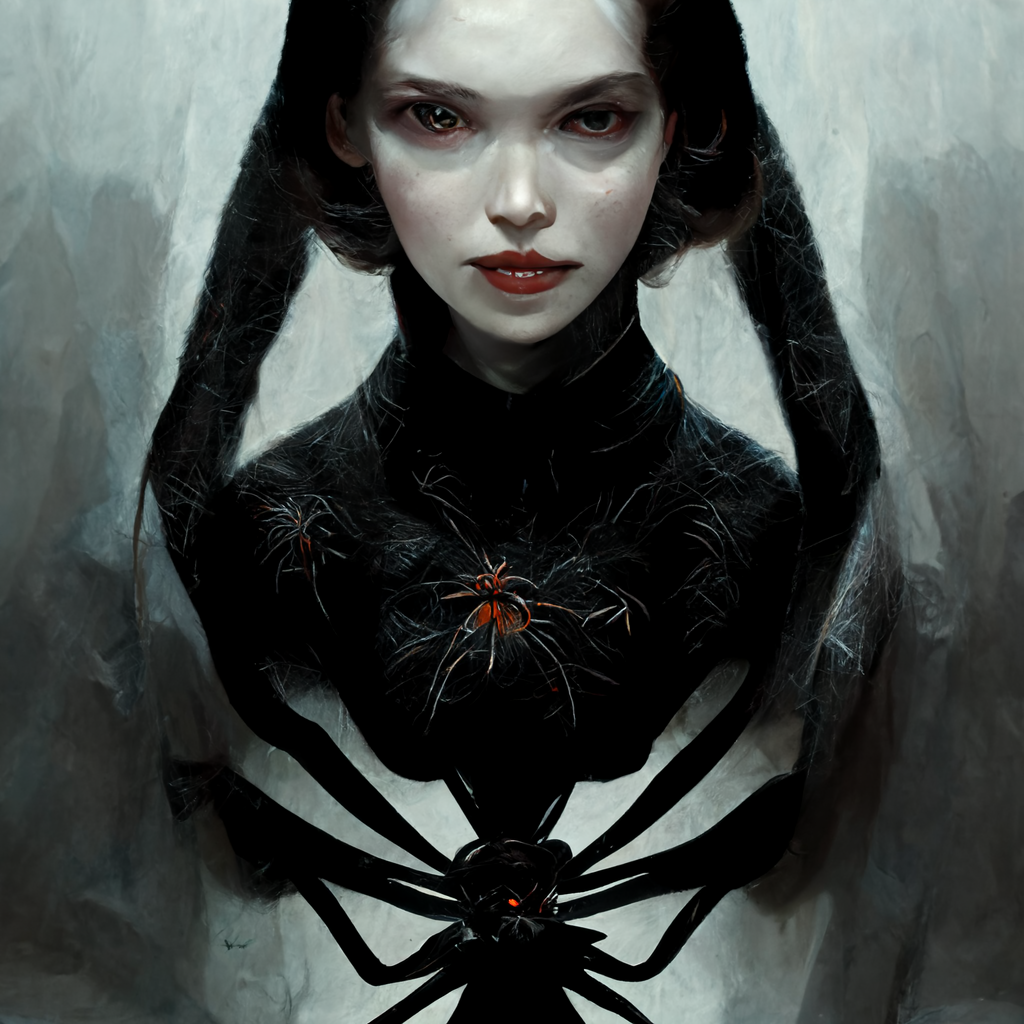
Inspired by “Lilith,” antagonist from “The Cruelest Team Will Win” and Trail of Shadows
I worked with poet and editor Roger Dutcher to complete The Alchemy of Stars, an anthology collecting the first twenty-five-plus years of Rhysling Award winners — the book had been stuck in limbo. I worked with SFPA Founder Suzette Haden Elgin, a wonderful person who I still miss, to publish the Science Fiction Poetry Handbook, a treatise of sorts on how sf poetry can be written that she was offering as a fundraising tool to the association she started. I reached out to members who had dropped out and asked them to come back and I hard-sold the organization to prospective new members wherever I could within the resources I had at the time.
In the end, though, backing away was the right thing to do. I made myself accept that I had made my investments and what happened next was up to others. From what I gather, in the years since, even during rough patches, SFPA has never come close to backsliding to the state it was in when that “dangerous notion” took hold of me.
Perhaps one amusing measure of my success could be the awkwardness those efforts sometimes cause me to this day, now that I’m no longer writing much poetry or sticking my nose into Poetryland affairs, because people who encountered that man on a mission remember him vividly and presume he and I are still the same person. At one time I really was at the center of that intriguing world, where the audience might be small but the artists are often up to really interesting, even mind-stretching things; but now people come to me for advice on, for example, a press to pitch a poetry collection to, and I can only shrug: I have no idea!
One thing I hope more speculative poets will take to heart is that publicly complaining about a lack of respect will never draw that respect. Instead, make the case for why speculative poetry deserves interest, even admiration. Share a poem you wrote, or one you like that someone else wrote, and let listeners hear why those words challenge and delight. That tactic always worked for me.
What genres/forms do you find yourself most comfortable in now?
I’m not comfortable sticking to any one genre, really, though most everything I write ends up having some sort of dark element or twist.
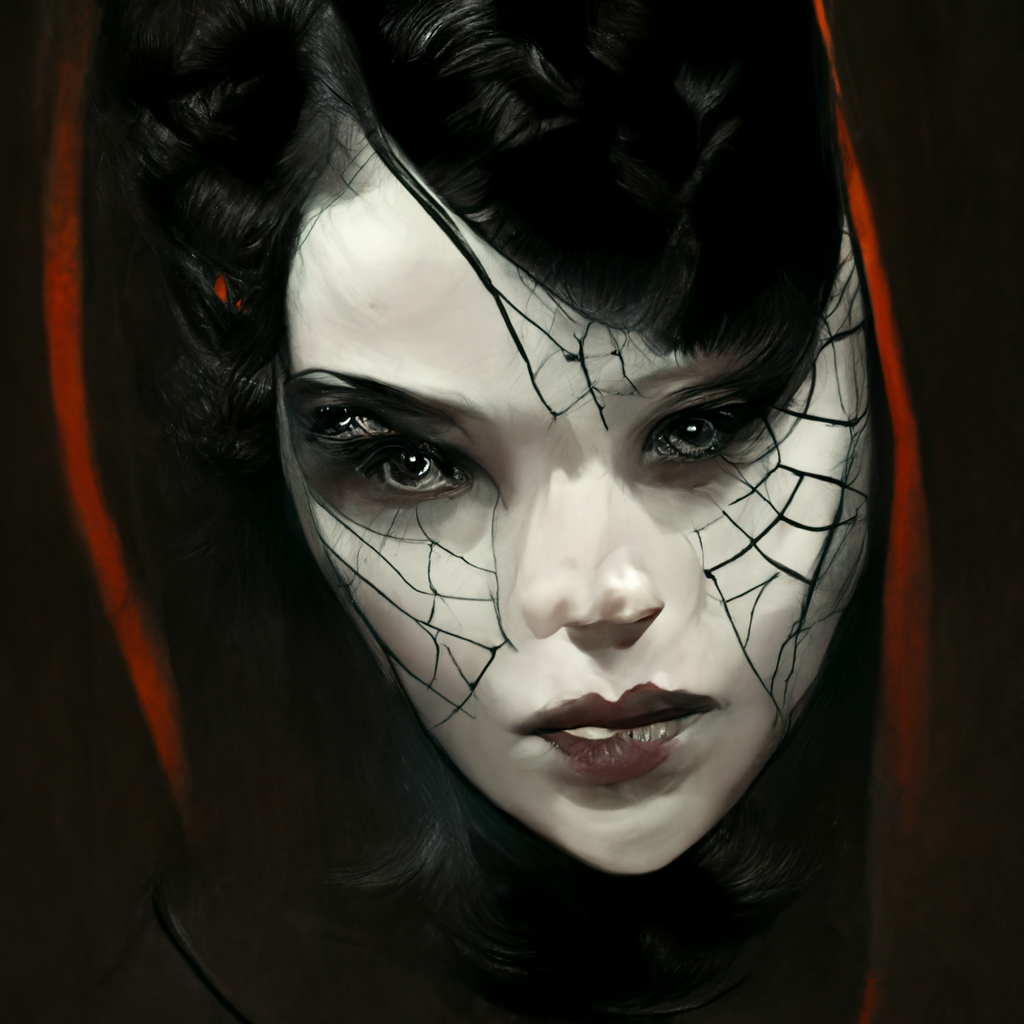
Inspired by “Lilith,” the antagonist from “The Cruelest Team Will Win” and Trail of Shadows
When he wrote the introduction to Aftermath of an Industrial Accident, the amazing Punktown author Jeffrey Thomas perceptively nailed my joy and my curse: “Many writers endeavor to establish a certain style or voice or tone, to clear a small but distinct plot of ground they can build within, so as to create a kind of brand that inspires recognition in a reader … But those writers who do as Mike does have a special place in my heart. And what Mike does, as I say, is just about everything. In these pages you will encounter straight up horror. Experimental horror. High fantasy. Science fiction. Poetry. The consistency, here, is simply excellence.”
Maybe I would be better off if I stayed in one lane and reworked similar themes and techniques over and over, but it’s just not how I roll. Obviously, I take a lot of pride in my work, but I’ve little interest in limiting myself to producing cookie cutter-styled stories for the sake of “brand-building.” (That’s not to say it’s innately a bad thing — if the muse entices you to build a brand, more power to you!)
In terms of forms, I am absolutely much more focused on fiction these days, to the degree that I can set aside any time to focus on creative writing.
As a poet I wrote a number of series: there was the “Disturbing Muses” series of ekphrastic poems based on the lives and works of 20th century artists, there were series that riffed on my “Petting the Time Shark” and “Defacing the Moon” poems from early on in my poetry-writing career, a trilogy of “Midnight Rendezvous” poems, a lot of concrete poems that, really, were inspired by the Alfred Bester-esque way Harlan Ellison played with text on the page in some of his stories. My poem “Phase Shift,” which is half upside down, is a direct reaction to “Theory of Tension” from Mind Fields, Ellison’s collaboration with artist Jacek Yerka.
My friend and colleague Nicole Kornher-Stace once challenged me to write stories the way I wrote poetry, and the result was “Twa Sisters” (collected in The Spider Tapestries) an ekphrastic short story full of concrete poetry tricks like two or three vertical columns on a page indicating simultaneous actions from multiple points of view. I’m really proud of that story — Nicole’s point generally though was that I was demonstrating a fluidity with poetry that wasn’t always evident in my prose. Now it’s skewed the other way.
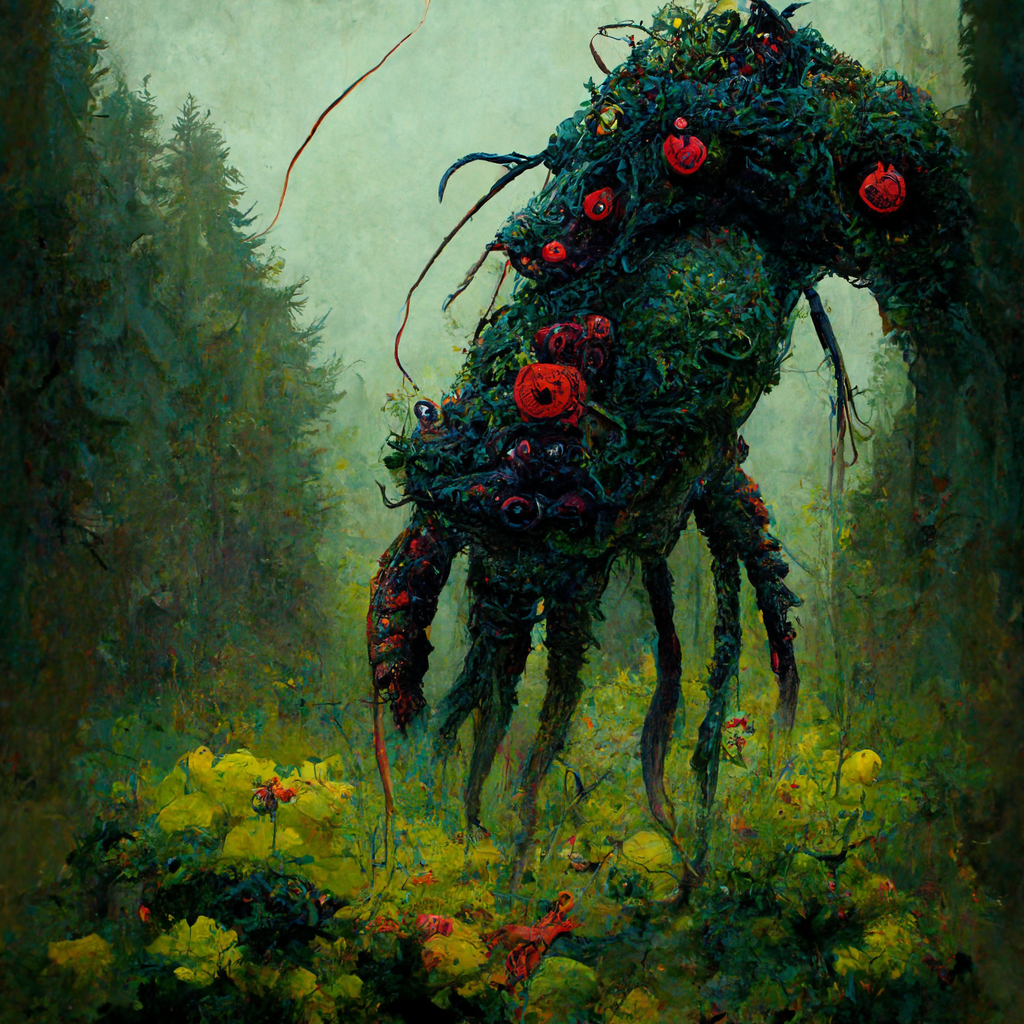
Inspired by “the Mothers” from “Drift from the Windrows” and “Matres Lachrymarum”
And I’m creating several series of short stories — I don’t always plan installments in advance, but more and more of my tales are connecting as I spy opportunities to tie together unexpected threads. There’s a map I made that shows how all the published pieces (or in the case of my novel Trail of Shadows, soon-to-be-published pieces) connect.
I don’t think at the moment I have the discipline (or the spare time!) to generate the tons and tons of background notes involved in world building, but a sort of world building is happening nonetheless, the way globs of quicksilver randomly clump together to form an advanced model of Terminator.
How does your work as an editor differ from what you like to write? Do you think there are reasons for those differences?
It amazes me still: My tastes when selecting poetry and fiction to include in projects like Clockwork Phoenix and Mythic Delirium run in distinctly different directions from the subject matter I choose to tackle as a writer.
This might seem a little dotty, but I genuinely believe that the name I picked for the publishing portion of my side hustle, Mythic Delirium, had some effect on how my preferences as an editor grew. I brainstormed the name while I was still a student at Virginia Tech, and at that age I thought of it as both a term that suggested a wide tent under which all sorts of surprising genre combinations might reside, and as an excuse to create a cool logo to adorn a magazine cover. (Prime example, the logo that artist Tim Mullins came up with in 2000 and refined in 2009, and that we still use, even though the zine closed in 2018.) Shepherding a publication with the word “mythic” in the title steered us in a direction of mythic content, I am sure of it.
I didn’t daydream of editing as a youth and the notion that this was something I had a talent for never occurred to me until I tried it and didn’t fall flat on my face. (The story behind that first anthology I put out in 1995, New Dominions: Fantasy Stories by Virginia Writers, is a wild one, and too complicated to go into for this occasion. I did talk about it in the interview I gave Locus in 2017, if you’re super-curious.) As a result, I think it’s fair to claim that my skills and interests as an editor evolved as their own separate thing, independent of my interests as a writer, which are more closely related to my formative interests as a casual reader.
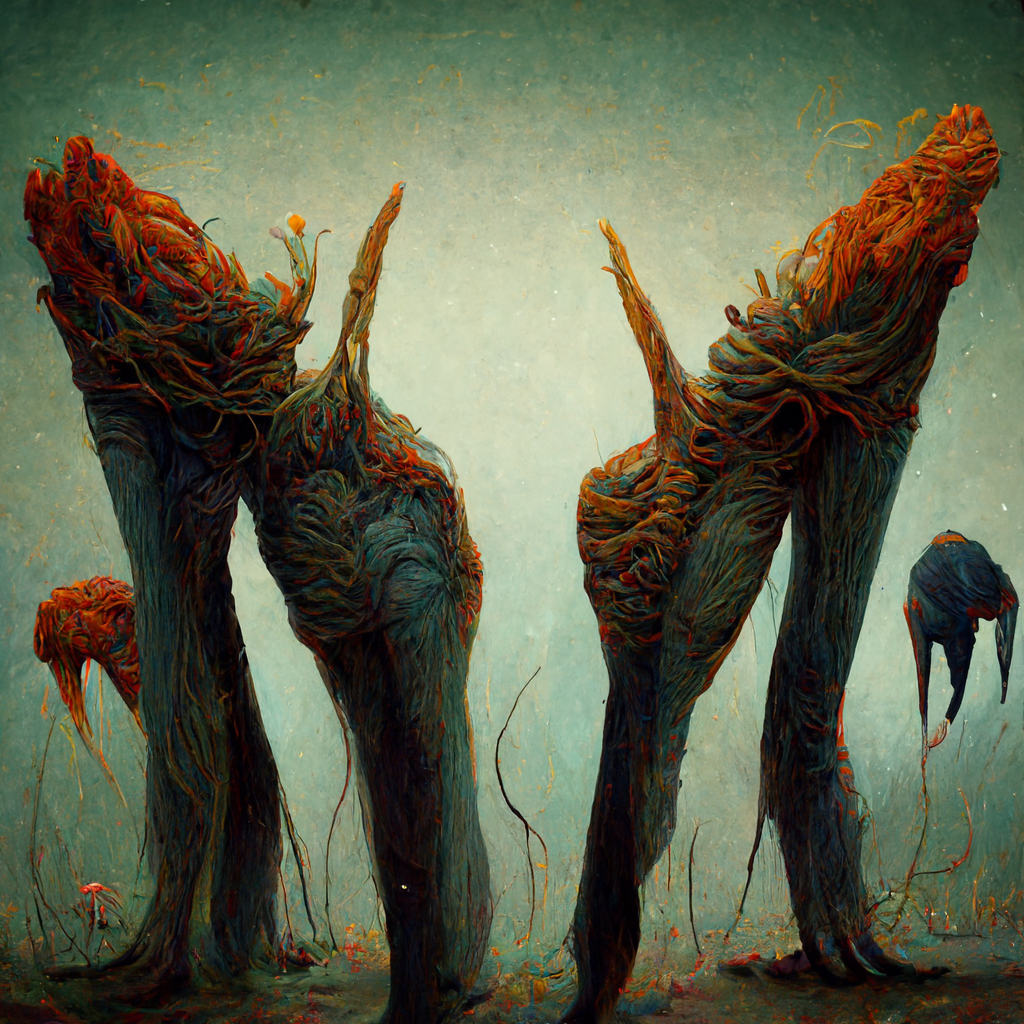
Inspired by “the Mothers” from “Drift from the Windrows” and “Matres Lachrymarum”
The way I read as an editor is rather unlike how I read for fun. (Of course, what I find fun isn’t particularly typical, either.) I want as an editor to be genuinely surprised, to finish a piece feeling that I have never ever read anything quite like that before. The title I came up with for the anthology series I’m most associated with, Clockwork Phoenix, is meant to evoke unclassifiability and even impossibility, a creature of a nature so contradictory it cannot exist, yet somehow on the page it does.
Thus, as a writer, I gravitate toward generating my own personal versions/visions of The Books of Blood, Angry Candy or Grimscribe: His Lives and Works — but as an editor, an occupation that sprouts from a different era of my creative life, I want the poetic, the mind-bending, the beautiful, the genre-blending, and though I won’t shy away from darkness I also snatch up helpings of the joyful and the just plain (or very not plain) strange, because I want to shape a well-balanced experience, thought-provoking, exuberant.
As a writer, I want to tip readers into the abyss. At least most of the time.
